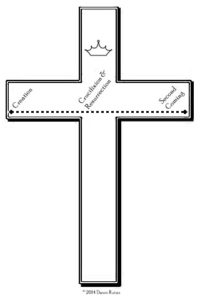Written by Dawn Rutan
In some recent reading I encountered the idea of “sins of identity,” where we justify or even celebrate sin by saying “That’s just the way I am.” In our scientific-oriented society, we tend to point to biological factors to explain and excuse the way we think, feel, and behave. But a genetic proclivity towards alcoholism (for example) does not mean drunkenness is okay. Genes are only part of the story.
I think sometimes the difficulty comes in discerning what things are truly sin and what are just normal variances in personality types and interests. To take this a step further, what elements of personality and socialization are part of the flesh and therefore eliminated in the new creation, and what ones are not? I don’t think heaven will come with a complete personality overhaul. However, if anything is related to fear/anxiety or pride/shame, obviously that will have to be removed. The question is, what should that look like now as we are being conformed to the image of Christ and transformed by the renewing of the mind?
I started researching Scriptures that speak to the difference between the old man and the new creation. Probably Galatians 5:19-23 is the clearest list of what needs to go and what needs to grow:
“Now the works of the flesh are evident: sexual immorality, impurity, sensuality, idolatry, sorcery, enmity, strife, jealousy, fits of anger, rivalries, dissensions, divisions, envy, drunkenness, orgies, and things like these. I warn you, as I warned you before, that those who do such things will not inherit the kingdom of God. But the fruit of the Spirit is love, joy, peace, patience, kindness, goodness, faithfulness, gentleness, self-control; against such things there is no law” (ESV, see also Colossians 3).
I’m sure we can all find some things in those verses that we need to work on. My prayer at this point is that God would give me specific direction and reproof where needed, and would remove any false guilt the enemy seeks to lay on me. I don’t want to become overly introspective, but nor do I want to become calloused to God’s work in my life. Finding that balance is not easy. It is clear that we all have blind spots, and the things I see in myself may not be my biggest problems. It would be easy to tune out what others may have to say.
As I was thinking about the contrast between old and new, I coincidentally read a couple different chapters and took note of these verses:
“Indeed, I count everything as loss because of the surpassing worth of knowing Christ Jesus my Lord. For His sake I have suffered the loss of all things and count them as rubbish, in order that I may gain Christ…” (Philippians 3:8).
“I fear that when I come again my God may humble me before you, and I may have to mourn over many of those who sinned earlier and have not repented of the impurity, sexual immorality, and sensuality that they have practiced” (2 Corinthians 12:21). “Their end is destruction, their god is their belly, and they glory in their shame, with minds set on earthly things.” (Philippians 3:19).
What stood out to me was that in Christ even the good seems bad, but in the flesh even the bad seems good. For those who know the surpassing worth of Christ, even the best achievements and successes of life pale in comparison. But for those who do not value Christ, all the evils of this world start to look desirable and laudable. I think of some who claim to be Christian but have embraced a sinful identity, and I wonder if they will be among those who hear “Depart from Me, I never knew you” (Matthew 7:23). I pray that those I love will not fall into that trap of self-deception.
My hope is that I would never desire anything above the “surpassing worth of knowing Christ” and I would “seek first His kingdom and His righteousness” (Matthew 6:33). And as we heard in last Sunday’s sermon on Wisdom & Discipline, we who are in the Body of Christ have an obligation to remind and correct one another in love. May we never shirk that duty out of fear or ignorance.
“The ear that listens to life-giving reproof will dwell among the wise. Whoever ignores instruction despises himself, but he who listens to reproof gains intelligence. The fear of the Lord is instruction in wisdom, and humility comes before honor” (Proverbs 15:31-33).
© 2016 Dawn Rutan. The views stated may or may not reflect the beliefs of the pastor or leadership of Dulin’s Grove Church.





